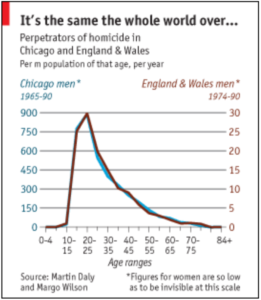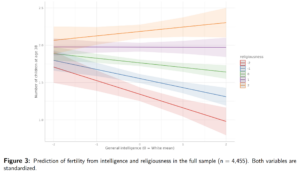Over on Twitter/X, science journalist i/o writes:
I get replies all the time under my posts that suggest or claim that wildly disproportionate black violence and the apparently unmovable US black-white IQ gap are due entirely or mostly to “genetics.”
I try to follow the evidence. There is no good direct scientific evidence for the claim that the massive disproportionality of black violence in the US is due to genetic differences between blacks and other groups. (Even when research indicated that the 2-repeat allele of the MAOA gene found most often in African-American males might explain differences in rates of violent crime, it still didn’t account for a sizable percentage of black violence. Also, these findings are seriously questioned.) There is a smattering of indirect evidence (I won’t go into it here because it would take a thread to discuss), but this falls well short, in my view, of allowing someone to make a good faith claim of a group genetic propensity toward violence.With respect to IQ, I also follow the evidence. But unlike the question of black violence, there is an extensive body of scientific research supporting the claim that genetic differences between blacks and whites influence the black-white IQ gap. But this research does not in the view of most scientists show that the entirety of the gap can be explained by genetics. Instead most scientists (if expert surveys are to be believed) think that both genetics and non-genetic factors (“environment”) are responsible, but that the precise amount of influence of each on the gap cannot be reliably determined at this point. This is my view, as well.
i/o is right there is little direct evidence, but wrong about the general case. The indirect evidence taken together makes a strong case. As I wrote in my reply:
Why do you think Africans are above average violent in every country measured on earth at all times? If not genetics? What is the other constant factor you can plausibly point to?
So let’s first review the evidence on African violence across time and place.
Africans and violence
We can begin with the country with the most data, USA. These differences go back as far as recorded data do:
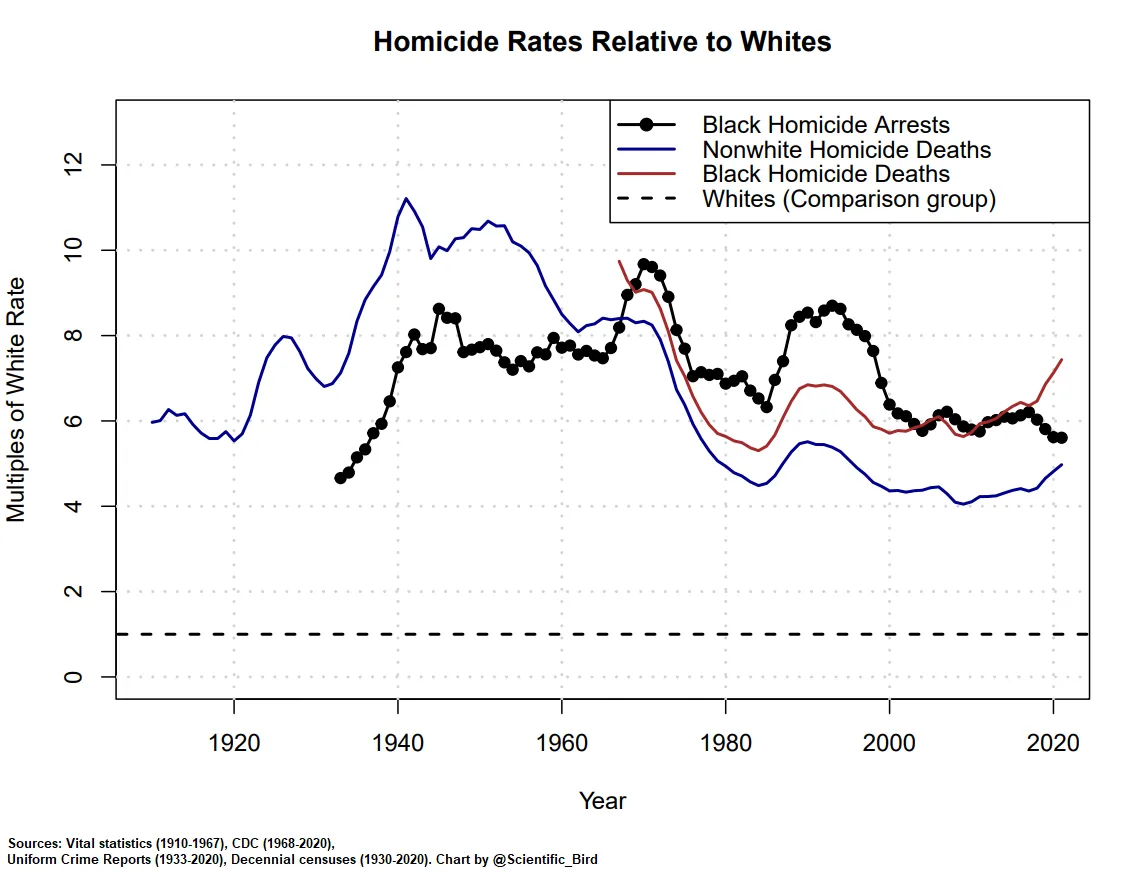
United Kingdom (which we covered before):
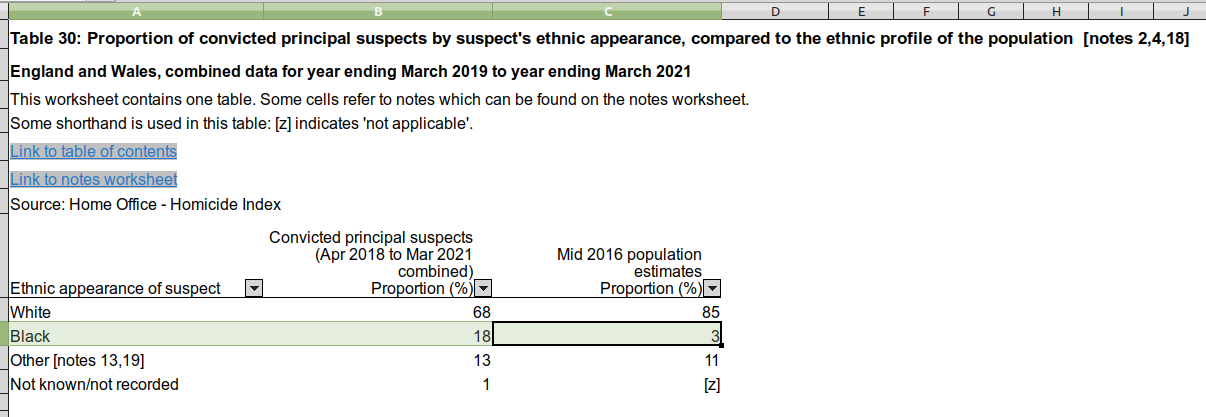
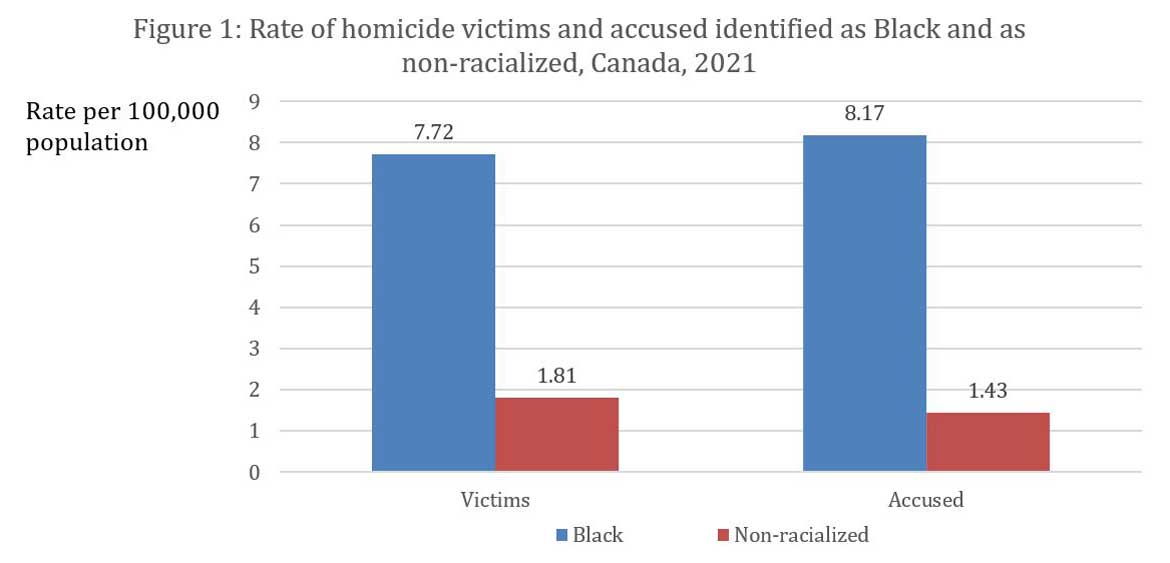
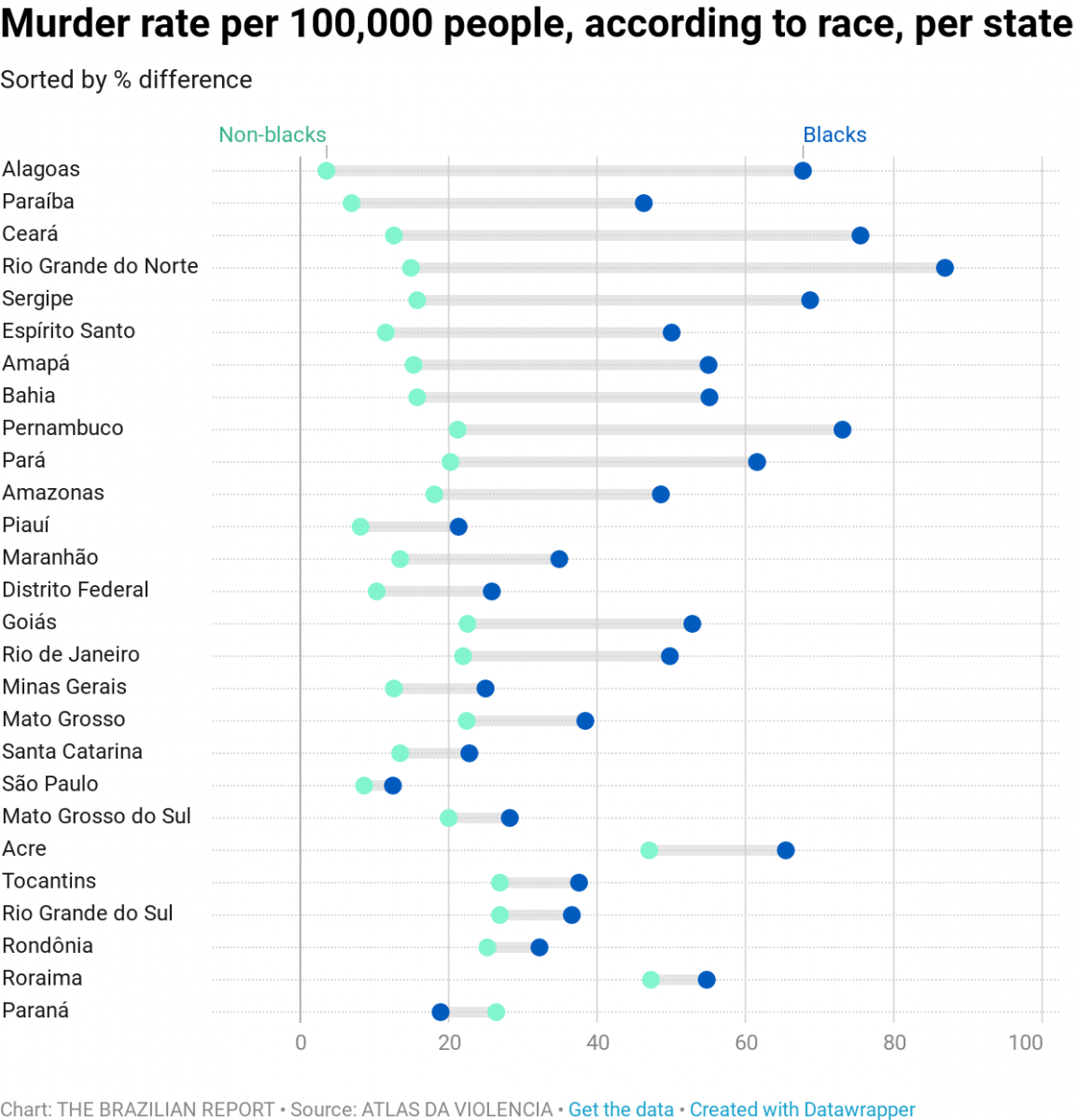
And here’s a short documentary about Africans in Japanese prisons:
I could go on, but you get the idea. Everywhere at all times we have data for, Africans are highly involved in violent behavior compared to (most) other people living in the same country. Why? If a pattern is consistent across time and place, naturally, we should begin with the simplest model to explain this: a single constant cause. Genetics is a suitable candidate. There’s no other real candidate, really. Anti-African sentiment? Just begs the question of why people acquired this sentiment to begin with. People aren’t born hating others, it is something they learn for a reason or another. Since we know demographic stereotypes are extremely accurate, the pervasive stereotypes of Africans being prone to violence is good evidence of their actual behavior. European colonialism? Africans are prone to violence everywhere, whether they exist in large or small numbers, whether the country is run by Europeans, Asians, or Africans. But in any case, there’s no good evidence legacy of colonialism causes violent behavior. After all, Singapore and Hong Kong are extremely safe places despite recent British colonial history.
Purely socioeconomic factors
Naturally, some people will claim that Africans violent because they suffer from poor non-genetic factors that aren’t caused by themselves, say, poverty. But this merely suggests the sociologist’s fallacy. Consider these causal models:
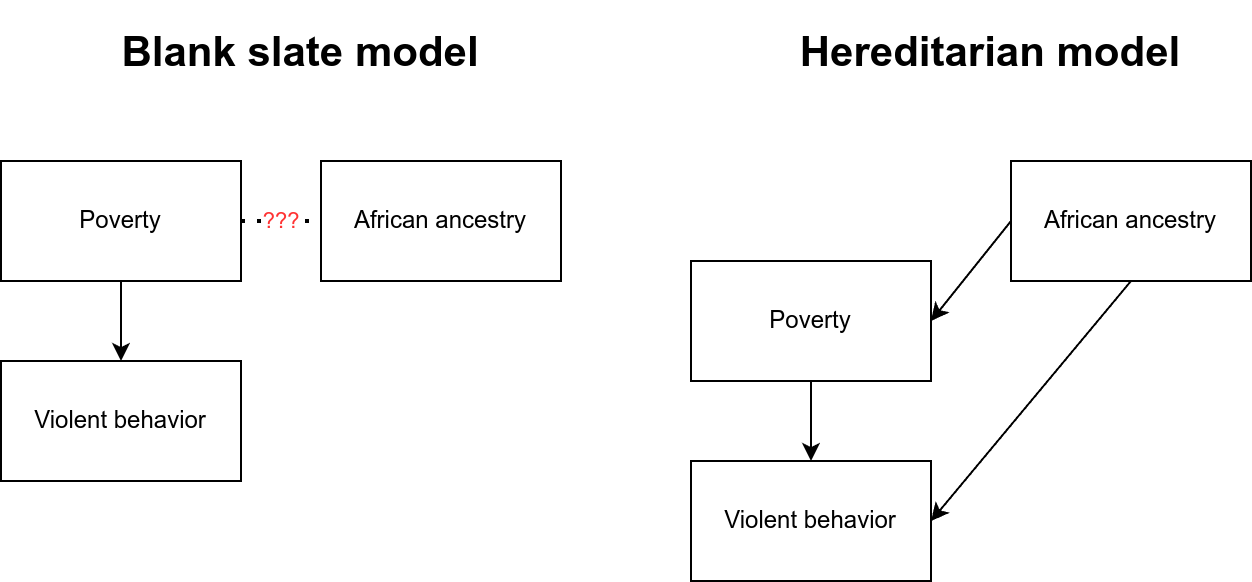
On the blank slate model, African ancestry just happens to be correlated with, say, poverty across time and place. That model has nothing to offer to explain the regularity of the observation. On the hereditarian model, on the other hand, there’s no big mystery. Africans themselves cause their own poverty, low education, and also their crimes. No mystery needed. The sociologist’s fallacy consists of observing associations among poverty, race, and crime, seeing that controlling for poverty reduces the race differences in crime rates, and then concluding that exogenous poverty is causally responsible for this. This inference simply doesn’t follow. The hereditarian model makes the same prediction but for a different reason (controlling for a mediator reduces the direct effect of an ultimate cause).
But we can go further. For instance, here’s the American race differences in crime rates by income levels:
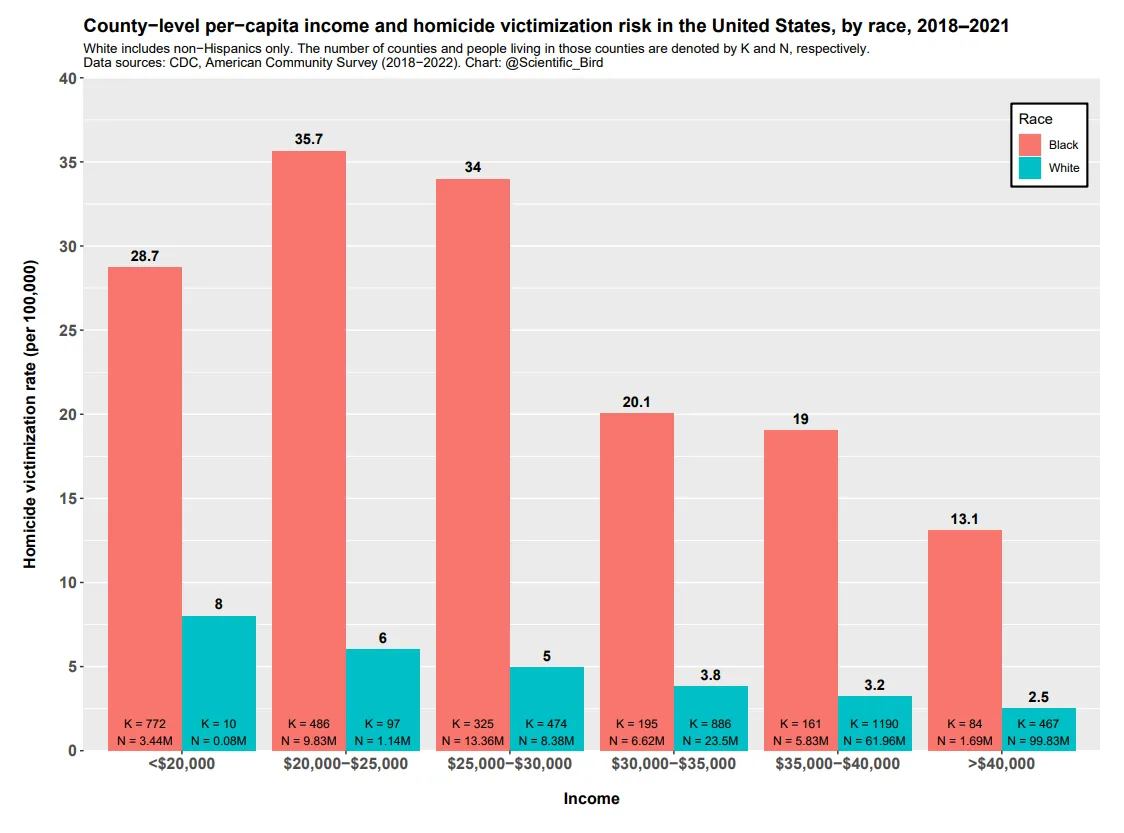
Clearly, no matter what income level we look at, there are large race differences in homicides (rates of victimization and perpetuation follow the same pattern).
We can also look at household incomes for race and incarceration (which is mostly due to violent crimes):
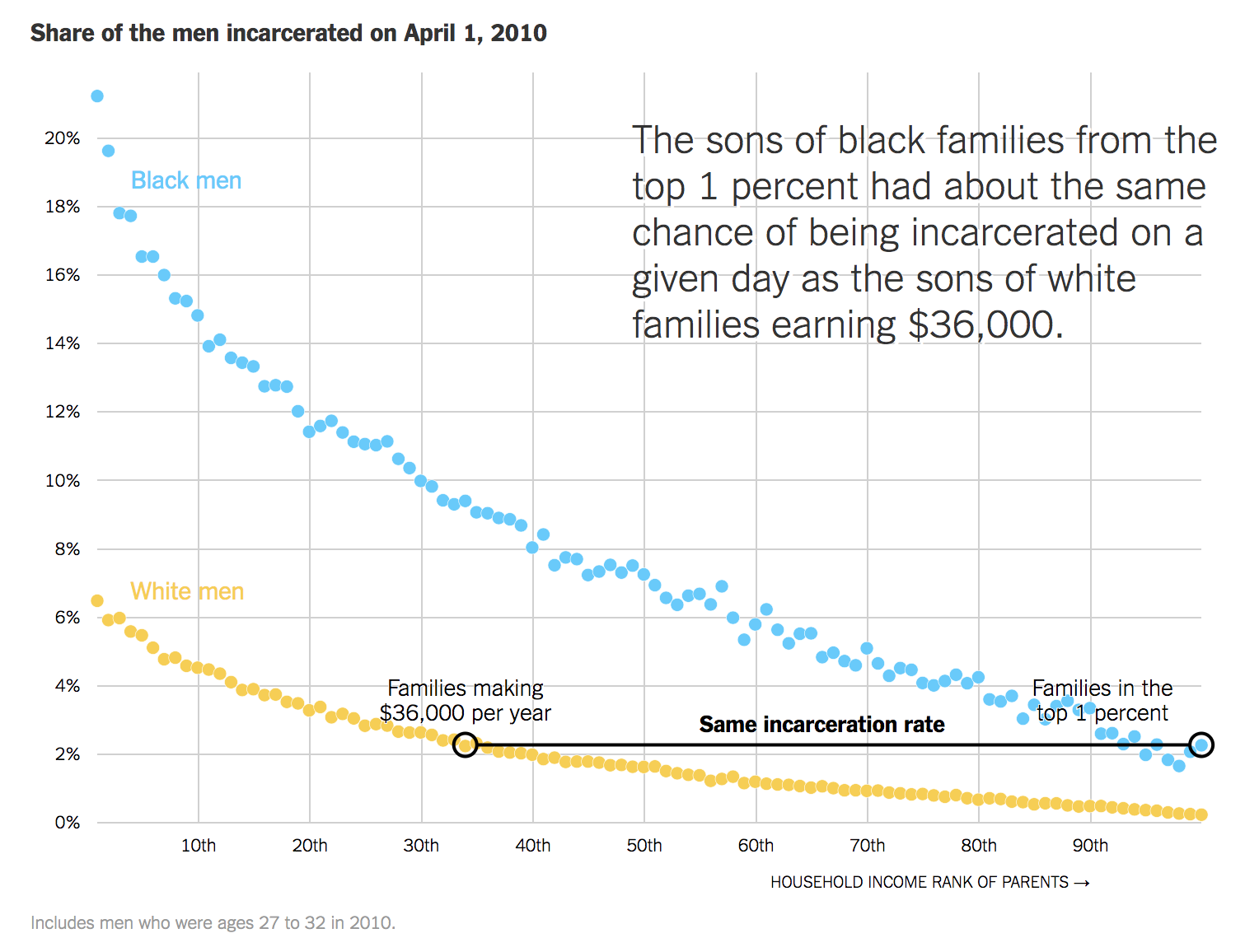
Growing up poor cannot statistically explain the large difference in incarceration rates.
But in fact poverty and income is a non-starter as an explanation because poverty does not actually cause criminality to begin with, it is just correlated with it:
- Sariaslan, A., Mikkonen, J., Aaltonen, M., Hiilamo, H., Martikainen, P., & Fazel, S. (2021). No causal associations between childhood family income and subsequent psychiatric disorders, substance misuse and violent crime arrests: a nationwide Finnish study of> 650 000 individuals and their siblings. International journal of epidemiology, 50(5), 1628-1638.
Background Childhood family income has been shown to be associated with later psychiatric disorders, substance misuse and violent crime, but the consistency, strength and causal nature of these associations remain unclear.
Methods We conducted a nationwide cohort and co-sibling study of 650 680 individuals (426 886 siblings) born in Finland between 1986 and 1996 to re-examine these associations by accounting for unmeasured confounders shared between siblings. The participants were followed up from their 15th birthday until they either migrated, died, met criteria for the outcome of interest or reached the end of the study period (31 December 2017 or 31 December 2018 for substance misuse). The associations were adjusted for sex, birth year and birth order, and expressed as adjusted hazard ratios (aHRs). The outcomes included a diagnosis of a severe mental illness (schizophrenia-spectrum disorders or bipolar disorder), depression and anxiety. Substance misuse (e.g. medication prescription, hospitalization or death due to a substance use disorder or arrest for drug-related crime) and violent crime arrests were also examined. Stratified Cox regression models accounted for unmeasured confounders shared between differentially exposed siblings.
Results For each $15 000 increase in family income at age 15 years, the risks of the outcomes were reduced by between 9% in severe mental illness (aHR = 0.91; 95% confidence interval: 0.90–0.92) and 23% in violent crime arrests (aHR = 0.77; 0.76–0.78). These associations were fully attenuated in the sibling-comparison models (aHR range: 0.99–1.00). Sensitivity analyses confirmed the latter findings.
Conclusions Associations between childhood family income and subsequent risks for psychiatric disorders, substance misuse and violent crime arrest were not consistent with a causal interpretation.
In fact, when people win lotteries, their criminal behavior isn’t affected either.
Similarly, one cannot point to educational attainment as a cause. Why? African violence begins much before people finish their educational journey. One can see this e.g. in school violence rates (US data):
The recent Department of Education survey on racial disparities in public education found that black students were still getting the boot from schools faster than any other group, and that included black females, who were disproportionately suspended and expelled more than white females from schools. But it also found that the students were getting suspended in astoundingly disproportionate numbers even before they ever set foot in a regular school classroom. According to figures, nearly 50 percent of preschoolers who received more than one suspension were blacks. This was double that of white students though blacks made up less than 20 percent of public school preschoolers.
No matter what age they were suspended or expelled, the students were far more likely to wind up in police stations and courtrooms after removal. This cast an even harsher glare on the stiff punishment school officials routinely dish out to black students who allegedly misbehave. It’s no overreach or apology for misconduct to say “allegedly” about the reasons for their suspensions, expulsions and often arrest. Teams of academics closely examined the notion that black students were more violent, disruptive or menacing than white students. They found that the disparities in suspensions didn’t result from blacks “acting out” in the classroom more than whites. The heavy-handed oust of black students from schools is also a major factor in the grossly high dropout rate of black students from many inner city schools.
But in any case, even if educational attainment was causal, one would have to explain why Africans attain lower levels of education everywhere they go to begin with.
If you are interested in more of these “control for other things” studies, there’s a number of them reviewed at the archived Alternative Hypothesis blog.
More direct evidence
Is there something more direct, like i/o is asking for? Well, yes. We know that one of the internal causes of violent behavior is being male, which of course, relates to male hormones, and so of course we find that measured testosterone levels predict violent behavior. And if we check whether Africans are higher in testosterone, we find they are:
- Richard, A., Rohrmann, S., Zhang, L., Eichholzer, M., Basaria, S., Selvin, E., … & Platz, E. A. (2014). Racial variation in sex steroid hormone concentration in black and white men: a meta‐analysis. Andrology, 2(3), 428-435.
Sex steroid hormones are associated with chronic diseases and mortality with risk associations that differ between racial and ethnic groups. However, it is currently unclear whether sex steroid hormone levels differ between black and white men. The aim of this study was to assess racial variation in circulating testosterone, free testosterone, sex hormone-binding globulin (SHBG) and estradiol levels in men. We searched PubMed for articles comparing circulating hormones in black and white men. A meta-analysis was performed using weighted mean differences (WMD) to compare hormones levels between black and white men. Fifteen eligible studies were identified; three did not report adjusted means. After age adjustment, free testosterone levels were significantly higher in black than in white men (WMD = 4.07 pg/mL, 95% CI 1.26, 6.88). Depending on the free testosterone concentration in white men, this WMD translates into a racial difference ranging from 2.5 to 4.9%. Total testosterone (WMD = 0.10 ng/mL, 95% CI −0.02, 0.22), estradiol (WMD = 0.67 pg/mL, 95% CI −0.04, 1.38) and SHBG (WMD = −0.45 nmol/L, 95% CI −1.75, 0.85) concentrations did not differ comparing blacks with whites. After adjustment for age, black men have a modestly but significantly 2.5 to 4.9% higher free testosterone level than white men. Based on previous studies on effects of sex steroid hormones on risk of chronic diseases or mortality, this modest difference is unlikely to explain racial differences in disease risk.
Mind you that measured testosterone at some given point is a very noisy estimate of the relevant quantity of interest, namely, the total effect of testosterone on a person, which is a function of their lifetime testosterone levels as well as their relevant receptor counts. Because of this severe measurement issue, observed correlations between testosterone and anything are usually quite small. See my prior book review on this topic.
There are a few GWASs (genetic prediction models) of violent behavior, but as far as I know, no study has computed these by race so that we can see whether they differ or not. So we still have to wait for that result.
As far as I know, no one has calculated genetic ancestry proportions in a study and related this to criminality. There are very few datasets with this kind of data, but one of them is the Add Health. If someone has access to that dataset, they can let us know what they find.
Conclusions
In every society with known data, Africans have above average levels of violent crime involvement. This regularity calls out for an explanation which plausibly should also be a regular factor, that is, constant (Occam’s razor). African ancestry is a good model. The theory here is that we know violent behavior is strongly heritable, that is, caused by genetic differences that vary among individuals between families. This genetic variation is due to 10,000s of genetic differences of small effect size, making them hard to find in studies. The hereditarian model for race differences is thus simple: these genetic variants are present in all races (ancestries), but are somewhat more common in Africans, and somewhat less common in Asians (who are less crime prone everywhere they go, even when they are lower in intelligence than the Europeans whose country they live in). It should be said that this theory is about average differences only, and any given African person may or may not be inclined to violence, in the same way which is true for any other group difference. There’s no real contrary model except for positing magical non-genetic factors that just so happen to follow Africans around the glove anywhere they go. Magic bad dirt theory.
The hereditarian model is about relative differences between groups, not absolute differences. A given society may experience a violent period, during which violence rates are higher for all groups (e.g. the early 1990s in the USA, see plot above). Furthermore, the model concerns the frequencies of the genetic variants in representative samples. One cannot disprove the model by finding an elite subset of the group somewhere and showing they don’t have a high violent crime rate (e.g. elite migrants in USA from this or that country or race). The model likewise does not imply that Africans must have the highest murder or crime rate in every country at all times. Local conditions may apply, whether these are non-genetic factors (e.g. drug war in Latin America) or selection effects (elite or pleb selection for migrants).
i/o is right that there is little direct evidence in the form of polygenic scores for proneness to violent behavior that differ by race. The relevant datasets are simply not available to the public despite being tax funded, and even the genetic models (GWASs) needed to do the scoring are frequently hidden from use (so that such analyses cannot be done). At some point, some of these will leak and we will then get some answers, but for now we can’t. We do know, however, that testosterone is a potent cause of violent behavior, since of course it explain the male-female difference. For the record, the male-female difference in homicide rate is about the same as the African-European difference in the USA (about 8 to 1). Since Africans only have slightly higher levels of testosterone as far as we can measure, this causal factor probably can’t explain the entire difference. Considering the indirect evidence in its totality, the inability to explain the patterns using any known socioeconomic factors, and the regularity across time and space, it is reasonable to posit a genetic explanation for the elevated rates of violent behavior seen in Africans compared with most other races. I hope more data will become available so we can get more clarity on this matter.
Accepting the hereditarian model does also not mean that nothing can be done about violent crime. It is not fatalism. History shows that there are large differences between people born at different times, and these are too large to be explained by any genetic changes (criminals do in fact have more children so selection is positive for violent behavior). If we experiment with different policies, we can probably find things that work, whether this consists of just locking up the bad people a la Bukele (1% of people commit 63% of violent crime in Sweden), or something else, randomized trials will have to show the way.
